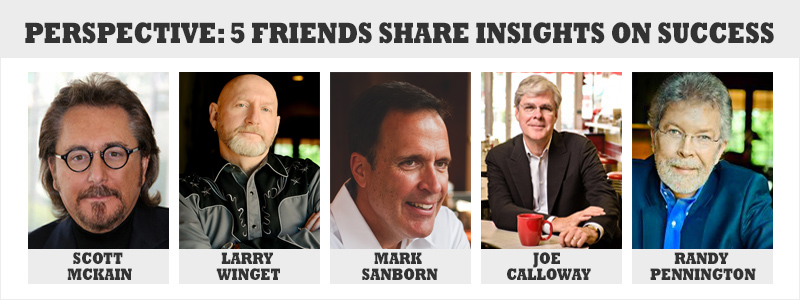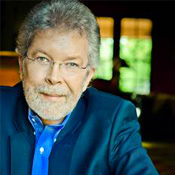
From Larry Winget:
 A leaders most important job: To lead. Duh.
A leaders most important job: To lead. Duh.
How do you lead? Not from behind, that’s for sure. Leaders have to get out in front with their ideas, vision, energy and presence.
As I watch movies and TV shows about the battles of old, I always see the leader, even when the leader was the King himself, sitting atop his horse and charging into battle out in front of his troops. What an inspiration that must have been to see their leader’s commitment to his beliefs, his words and to his troops by being willing to risk it all by riding ahead of them into battle. Of course, that also meant that he usually got killed first. There are consequences for being the leader. The risk is the reason they make the big bucks and why we record their names in the history books.
Few leaders today risk much. They rarely get out in front for fear of the consequences. They want the glory when it goes well but mostly they don’t want the blame when it doesn’t go well. They don’t want the responsibility for the mess because they might lose their job, or not get re-elected.
Larry Winget, the Pitbull of Personal Development©, is a six-time NYT/WSJ bestselling author, social commentator and appears regularly on many national television news shows. To find out more, go to www.LarryWinget.com.
![]()
From Mark Sanborn:
 A leader’s most important job is focusing the time and expertise of her team on doing the most important work of the organization.
A leader’s most important job is focusing the time and expertise of her team on doing the most important work of the organization.
All results and revenue are driven by how people spend their time (effort) and expertise (knowledge and skills). Profit, innovation, efficiency, effectiveness—everything is the byproduct of time and expertise. Invested wisely, the organization achieves great success. Lacking focus, mediocrity becomes the norm.
A leader isn’t just a person who is focused, but one who creates shared focus. There is a great deal of wasted time and expertise in companies where employees are doing low-priority work, or work that shouldn’t be done at all. But lacking an effective leader, it is difficult for them to know what they should be doing instead.
Just as a conductor makes sure members of an orchestra are all playing the right music to the best of their ability, so does an effective leader do his job. That is the most important job of the leader.
Mark Sanborn is president of Sanborn & Associates, Inc., an idea studio for leadership development. He is an award-winning speaker bestselling author of books including, The Fred Factor. For more information and free resources, visit www.marksanborn.com.
![]()
From Joe Calloway:
 What is a leader’s most important job? Clarity.
What is a leader’s most important job? Clarity.
First and foremost, clarity about culture. Everyone must be crystal clear about who we are, what we value, and how we treat people. Clarity about culture means that those who violate the culture must leave. (Your culture, by the way, may very well invite new ideas, criticism, and disagreements.)
Then, clarity about what is most important. Here I agree with Mark Sanborn wholeheartedly. An effective leader makes clear exactly where we are going and what we have to do to get there. Everyone knows what the priorities are and is focused on the execution of those priorities.
We’ve all had the experience of working for a leader who was unclear about expectations, direction, or values. It’s the worst. A leader with no clear direction can destroy an organization.
To achieve clarity, a leader must have the ability to make the complicated simple. Steve Jobs was a master of this. He once said “if you can make things simple, you can move mountains.”
Amen. Give us leaders who can enable us to move mountains. Give us clarity.
Joe Calloway helps great companies get even better. www.JoeCalloway.com
![]()
From Scott McKain:
 The leader’s most important job: make great decisions for the long-term benefit of the group.
The leader’s most important job: make great decisions for the long-term benefit of the group.
It’s important to recognize that the leader has to view both the group that he or she has been designated to lead, and the challenges and opportunities in front of them, from a strategic, “30,000 feet” level.
This means sometimes building consensus before the decision is made is the right choice – other situations call for developing support for a judgment the leader has already determined.
Note, as well, I suggest it’s for the LONG TERM benefit of the group – which is precisely why so many executives aren’t true leaders. They’re managing for this quarter’s numbers, not leading their companies to create distinction.
When the leader views the future from that “30,000 feet” level, it’s like looking out the window of an airplane – you can see much farther down the road with that perspective than someone driving to the same destination. It’s commonly referred to as the leader having “vision.”
Until women and men in positions of authority are willing to have a visionary perspective, and start making more great decisions with the long-term benefit of their group or followers in mind, we won’t see an expansion of great leadership.
To find out more about Scott McKain, go to: www.ScottMcKain.com
![]()
From Randy Pennington:
 Leadership is influence and the scorecard is results.
Leadership is influence and the scorecard is results.
The leader’s most important – you could say only – job is to influence others to deliver positive results. Results rule! Everything else is a discussion of the best ways to do so.
Ross Perot distinguished the difference between managing and leading very clearly: “You manage data and things. You lead people.”
And when it comes to leading people, there is nothing more important than creating a culture that consistently delivers positive results for the customer and the company.
Your culture is defined by your habits. My work with leaders and organizations has taught me that the best opportunities for consistent results occur when the culture reinforces these six choices at every level every day:
- Value candor and honesty
- Pursue the best over the easiest
- Focus the energy to make the main thing the main thing
- Leverage the power of partnerships with customers and staff
- Continually learn, grow, and adapt
- Show the courage of accountability
Your organization is perfectly designed to deliver the results you are delivering today. It is your job to build and sustain a culture that can deliver results tomorrow and beyond.
Randy Pennington helps leaders deliver positive results in a world of accelerating change. To find out more, go to www.penningtongroup.com.





I totally agree with all the inputs and they are right to that about a leader.
Just to add, i can say that the leader must have the ability to translate his vision I mean how does he expect his followers to understand his vision if he the owner can’t translate.
Just has a father in the house knows the abilities of all his kids, so does he with his team meaning that he needs to task properly starting with the weakest link to the rest.
It’s true to say that you manage data and lead people.